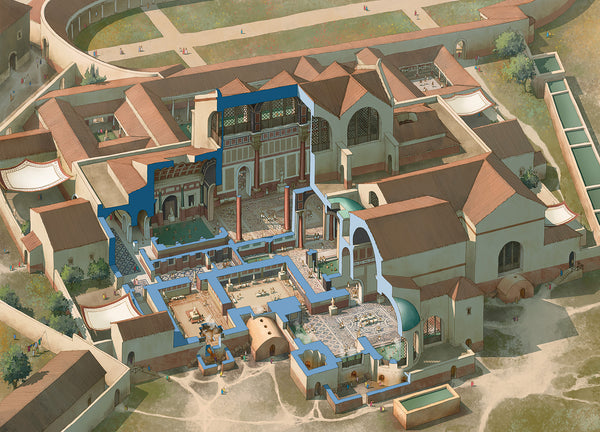Ancient warfare in Aberystwyth, 2014
Last week, I was in Aberystwyth, where I attended the International Ancient Warfare Conference. This was the second time that the conference had been organized, and you may remember me blogging about it last year (although I didn’t visit it back then). This year, it was again organized by Geoff Lee and it took up three entire days, from 1 July to 3 July.
This blog post won’t contain a run-down of the entire programme. You can read that yourself on the official website, although it isn’t always easy to read. For the most part, each day had two parallel sessions, and there were two keynote lectures on Tuesday and Wednesday.
The first day, Tuesday, I attended the morning session chaired by Helène Whittaker. Cezary Kucewicz, a PhD student from UCL who has also contributed an article to Ancient Warfare issue VIII.2, gave a lecture on the mutilation of the dead in the Iliad, a suitably violent topic to kick off the conference with. After the coffee break, I switched to the other session and listened to Roel Konijnendijk, who presented a paper written by Giorgia Proietti, who sadly couldn’t attend herself, on the Battle of Psyttaleia.
It was then time for Jon Coulston (St Andrews) to take to the stage with his keynote lecture, “Commemorating conflict landscapes in the early twenty-first century”. He has also written for Ancient Warfare in the past. His use of “conflict landscapes”rather than “battlefields”was deliberate, as not every conflict landscape was automatically a battlefield. For example, naval battles don’t take place on battlefields as such, and they generally leave little trace, apart from exciting finds such as bronze rams from the beaks of warships.
I had to chair the afternoon session on the first day, which meant that I missed Matthew Lloyd’s paper on settlement destruction in the eighth century BC (fortunately, I did get a copy of the paper!), as well as Roel Konijnendijk’s paper on Archidamus’ strategy against Athens. The speakers in my session all proved to have interesting presentations, however. Alessandro Brambilla talked about manpower in federal states such as Boeotia and Thessaly; Elizabeth Pearson defended Polybius’ assertion that the military levy gathered on the Capitoline; Liam Gale talked about the military and political influence that the Galatians had in the Hellenistic period, and; Tristan Herzogenrath-Amelung gave a lecture on the social status of Athenian epibatai (marines).
The next day, I attended Josh Hall’s session, with a variety of different lectures, of which Simone Agrimonti’s talk on applying some of Clausewitz’s principles to famous hoplite battles was perhaps the most interesting. The keynote lecture was delivered by Nicholas Sekunda, whose name most loyal readers of Ancient Warfare will recognize. His talk was on archers shooting from behind shield-bearers, and he made some interesting comparisons between Assyrian and Greek depictions of battle-scenes.
In the afternoon, I went to see the session chaired by Cezary Kucewicz, which was actually one of the few sessions that actually had a coherent theme, namely early Greek arms and armour. Marek Vercikgave a good lecture on how Greek arms and armour were affected by their contacts with “barbarians”(i.e. non-Greeks). Polyglot Lothar Willms – who has mastered an even larger than normal variety of languages, ancient and modern – next talked about descriptions of weapons and armour in Mycenaean tablets and Archaic Greek poetry. Wawrzyniec Miscicki had a lecture on the development of armour in Archaic Greece. Joshua Hall presented a paper in which he pointed out that the sword was actually a lot more important in Greek warfare than is generally thought.
Thursday was the third and final day of the conference. The programme was switched round a little bit as two papers dropped out at the last moment. I attended the lecture by Rob Bartholomew, brand director at the Creative Assembly, who talked about the Total War games and how they might be used in the class room. My own lecture was up next, in which I pointed out common mistakes made in the study of Greek warfare and how we can solve these problems to move the debate forward. Owen Rees, a regular contributor to Ancient Warfare, was up next and presented his paper on ancient PTSD, arguing that we should actually avoid talking about PTSD in ancient contexts.
All in all, the conference was extremely stimulating, with lots of good papers given by academics at virtually all levels: most were working on their PhDs or had recently finished them, while one or two were graduate students, and others were established researchers. Sharing an apartment with four other speakers meant that we could talk about ancient warfare virtually from the moment we woke up until we went to sleep, and I was pleasantly surprised to discover that, indeed, you never run out of stuff to talk about when it comes to this topic.
An edited volume with some of the papers presented during the conference should be forthcoming, though many speakers – myself included – have opted to publish our papers in peer-reviewed journals instead. My paper was well received and I will probably prepare a much abridged version of it for this blog in the nearby future.
The International Ancient Warfare Conference will be organized in Aberystwyth again next year by Geoff Lee. It was a great experience and I look forward to attending it again. If you have any interest in the topic – and since you are reading this blog I guess you do – you should really travel down (or up) to the pleasant Welsh town of Aberystwyth and spend some days with us there next year.

